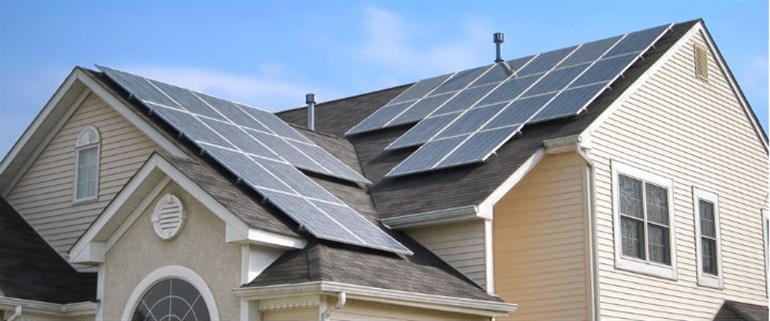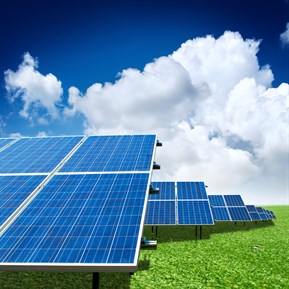Answer these simple questions and we will find you the BEST prices
Which type of solar quotes do you need?
It only takes 30 seconds
100% free with no obligation

Get up to 4 quotes by filling in only 1 quick form

Slash your energy bills by installing solar panels

For the average 2-3 bedroom house
- GreenMatch
- Solar Energy
- Solar Panels
- Solar Panel Facts
Solar panels - 20 things you need to know (October 2025)

Green energy is gaining popularity at a fast rate, and solar is one of the best eco-friendly options for homeowners. A solar panel is a group of electrically connected solar cells, enclosed in a frame, which converts sunlight into electricity. Switching to solar energy has many advantages, allowing you to save money while helping the environment, and may have a few limitations connected to the position of your house and weather conditions.
In this article, we'll go into more detail with 20 facts about solar panels. However, if you just want to cut to the chase and find someone who can help you install solar panels quickly, we've got you covered.
At GreenMatch, we have a UK-wide network of accredited and reliable solar panel installers. We can provide you with up to 3 free quotes from installers available in your area whom provide the best solar panels. This way, you'll have a better idea of local rates and can choose the best deal.
Click the button below to get your free non-binding quotes now.
- Quotes from local engineers
- Payment by finance available
- Save up to £1,567 per year
It only takes 30 seconds



1. The concept of harnessing energy from the sun is not new
The first to predict it might become a reality was Leonardo da Vinci, in the 15th century. The first solar cell was developed in the 19th century, but its solar efficiency was only 1%.
2. Solar energy is completely free and renewable
Once the initial solar panel costs are covered, you will not need to spend a cent on the electricity they produce. Moreover, you will reduce your carbon footprint by using solar energy, since it is totally green and renewable.
Solar energy users save, annually, as much as 75 million barrels of oil and 35 million tonnes of carbon dioxide. Plus, a huge amount of power can be harnessed from the sun: in just one hour, the Earth receives more energy than it would consume in an entire year (approximately 120 terawatts).

3. Made from earth-abundant materials.
The vast majority of available PV modules use silicon as their main component. This is good because there is plenty of silicon – it is the second most abundant element in the Earth’s crust. The silicon cells manufactured from one ton of sand produce as much electricity as burning 500,000 tons of coal.
Alternatively, conventional fuel sources have created an array of environmental and human health problems, including carbon dioxide emissions leading to climate change, acid rain, air pollution, smog, water pollution, rapidly-filling waste disposal sites, and destruction of habitat from oil spills and accidents.
4. There are two types of solar panels
Photovoltaic (solar PV) panels convert sunlight into electricity, while solar thermal panels heat water by absorbing the sun’s warmth, and can be used to heat homes or swimming pools.
5. The initial cost
The cost of installing solar panels is not to be overestimated, because even though prices are high the payback period is quite short due to the savings on electricity bills and the government aids. Homes equipped with solar panels sell faster and at a higher price than those without.
Advancements in technology and rises in the number of installations will likely bring down prices, due to economies of scale and lower cost of materials. PV costs have dropped precipitously, and now solar and wind are the least expensive electricity sources in most of the world. This makes getting regular or cheap solar panels one of the best choices for your home.
6. Low maintenance requirements
Once installed, almost no solar panel maintenance is required. You will only have to make sure they’re clean and not shaded by anything. A tilted roof will require less cleaning, since rain helps remove dirt. Additionally, solar panels have a very long lifespan. They carry a standard 25-years warranty, but can last up to 30-40 years.
PV panels have extremely low operating and maintenance costs. For the small systems on most people’s homes this cost is negligible compared to costs of other renewable energy systems and conventional power plants. PV systems, in general, simply do not require frequent inspection or maintenance of any kind.
7. Solar panels do not need direct sunlight to work

Even though maximum efficiency is reached when the sun is shining, electricity is still produced on cloudy days and during winter. On the other hand, no electricity can be produced at night, but a storage system can solve this problem. The solar battery costs can be paid off by selling excess energy to national grid and by the benefit of making you 100% energy independent. You should still consider that solar panels produce free electricity during the day, which is when it is more expensive and hence more valuable.
8. Potential issues
Prior to installing solar panels, you should consider the shape and inclination of the roof and the location of the house itself. In order to obtain the best annual performance, the roof should be facing south at a 30 degrees angle, approximately. These are not strict requirements, since solar panels also work in different settings, as long as the installation is free of shadows between 10am and 4pm. It is important to keep the panels far from bushes and trees for two reasons: they might shade the installations and the branches and leaves may scratch the surface, lowering their performance.
Excessive exposure to wind and rain may also degrade performance, in the long term, so shelter from the wind should be considered when evaluating placement. However, as mentioned previously, solar panels come with 25-years warranties, which guarantee that the output should not be lower than 80% within that time frame. Plus, surprisingly enough, solar panels do not work better in hotter climates. That is because solar cells harness sunlight and not heat, and their efficiency is decreased by high temperatures.
9. The technology is versatile
Solar panels can be used on any type of building, road, bridge, and even spacecraft and satellites. Solar energy is making its way into all aspects of life: lightweight, portable panels are already present on solar blinds for your windows and small devices like phone chargers.
Moreover, next-generation cars and boats are updating to solar. Large, empty areas are increasingly being used to host solar farms. The largest one is located in the Mojave Desert in California, and it generates 90% of the world’s commercially produced solar power.
PV systems are flexible and can be designed for a variety of applications and operational requirements and can be used for either centralized or distributed power generation.
10. Permissions
You will not need to apply for planning permission to install solar panels domestically, as long as your installation does not protrude more than 200mm. You will therefore need permission if your system is too large, or for other reasons such as placement within protected sites.
If you live in a UK conservation area and want to install solar panels, we have a specialised article on solar panels in conservation areas that can advise you on whether you need planning permission or not.
11. Highly reliable and have no moving parts
Even under the harshest of conditions, PV systems maintain electrical power supply. In comparison, conventional technologies often fail to supply power in the most critical of times.
12. Durable and have long service lifetimes
PV modules are very durable and have long service lifetimes. In general, modules carry a warranty of 80% of their rated power for 20 or more years. Thus, the worst case is an expected 1% decrease in performance per year.
There have been several studies showing that in the real world, there is even less degradation than this – at around 0.2%-0.5%/year., PV panels can be expected to last up to thirty years or longer.
13. PV panels are completely silent
PV panels are completely silent, which reduces noise pollution if they offset generators. This also makes PV a superior solution for residential and other applications - like libraries and schools where silence is an asset - that are currently powered with a diesel generator (it should be noted that inverters do produce a modest hum).
14. Modular and easily expandable
Unlike conventional power systems, modules may be added to photovoltaic systems to increase available power. Recent improvements in micro inverters and DC optimisers make this easier than ever before.
15. PV systems are safe
As PV systems do not require the use of combustible fuels, they are very safe when made by one of the best solar panel manufacturers.
16. Can be used to shave peak loads
Solar energy availability coincides with energy needs for cooling. Hot, sunny summer days are when air conditioning (AC) loads are high and PV panels are churning out electrical energy to feed them. Thus, PV systems provide an effective solution to energy demand peaks – especially in hot summer months in regions where energy demand is high. This benefits the electric grid as well because it lowers conventional electricity market prices due to reduced peak demand.
17. Works great at high altitudes
When using solar energy, power output is optimised at higher elevations. This is very advantageous for high altitude, isolated communities where diesel generators must be de-rated due to the loss in efficiency and power output.
18. Having grid-tied PV systems also helps improve the grid
PV can improve grid reliability, which is of use to electric utilities by providing voltage regulation, dynamic control, inverter ride through, and improved power quality.
Small-scale decentralised power stations reduce the possibility of power outages, which are often frequent on the electric grid. Similarly, detailed studies of electric outages on U.S. military bases show PV-powered micro grids can improve national security.
19. Offers reduced liability for power generators
Many traditional sources of power have substantial externalities, and there are a growing number of lawsuits pending to compensate victims of these externalities. Thus, PV reduces future costs of mitigating the environmental impacts of fossil fuels like coal and nuclear generation technologies.
20. Enhances local job creation
PV also enhances tax revenues associated with local job creation, which is higher for solar than conventional power generation. Solar creates both more jobs and higher paying jobs than fossil fuel-related employment.
If you are interested in investing in solar panels in Scotland, Wales, England or Northern Ireland, then simply fill in the contact form and our specialists will provide you with up to 3 quotes, completely free of charge. This service is non-binding, and only takes a minute! Click the button below to begin.
- Quotes from local engineers
- Payment by finance available
- Save up to £1,567 per year
It only takes 30 seconds




Joshua M. Pearce is the John M. Thompson Chair in Information Technology and Innovation. He holds appointments at Ivey Business School and the Department of Electrical & Computer Engineering at Western University. He runs the Free Appropriate Sustainability Technology research group.
We strive to connect our customers with the right product and supplier. Would you like to be part of GreenMatch?

Stay up to date with energy saving tips and grant alerts
Receive offers, marketing and promotions via email from Leads.io about GreenMatch and our brands/partners to help you save.
Thank you for subscribing to our newsletter!
Your email has been successfully added to our list. We look forward to sharing our latest updates with you soon!
